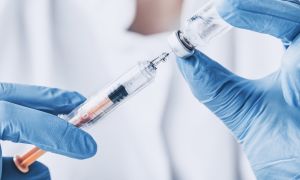Advertisement
The difference between live and killed vaccines has to do with how they are made. Live, attenuated vaccines contain a living, although significantly weakened, version of a virus or bacteria. Measles, mumps and chicken pox vaccines are made with live viruses.
The benefit of a live vaccine is that a single dose often provides lifelong immunity. The downside is that because viruses and other pathogens naturally mutate, or change, the virus within the vaccine could also change, creating a stronger version of itself that the immune system would have difficulty combating. This was an issue with the early oral polio vaccines, but is generally not a problem with current live vaccines, which are much safer than the virus they protect against.
Only people with a suppressed immune system (such as those who have HIV, who are taking immunosuppressant drugs or who are being treated for cancer) should be concerned about receiving live vaccines because they could, conceivably, become infected with the virus. These vaccines also usually require refrigeration.
Inactivated vaccines contain a killed version of the pathogen. They are more stable (meaning they don't need refrigeration) and safer than attenuated viruses, but they don't cause as strong an immune response. Thus, the immunity they provide may not last as long and you might need a "booster" vaccine down the road.
The benefit of a live vaccine is that a single dose often provides lifelong immunity. The downside is that because viruses and other pathogens naturally mutate, or change, the virus within the vaccine could also change, creating a stronger version of itself that the immune system would have difficulty combating. This was an issue with the early oral polio vaccines, but is generally not a problem with current live vaccines, which are much safer than the virus they protect against.
Only people with a suppressed immune system (such as those who have HIV, who are taking immunosuppressant drugs or who are being treated for cancer) should be concerned about receiving live vaccines because they could, conceivably, become infected with the virus. These vaccines also usually require refrigeration.
Inactivated vaccines contain a killed version of the pathogen. They are more stable (meaning they don't need refrigeration) and safer than attenuated viruses, but they don't cause as strong an immune response. Thus, the immunity they provide may not last as long and you might need a "booster" vaccine down the road.
Vaccines in the United States are classified as "inactivated" or "live attenuated."
An inactivated vaccine works when the immune system responds to a piece of a bacteria or virus or to a toxin produced by the germ.
Live “attenuated” vaccines mean they have been changed such that they do not cause disease. They grow inside the vaccinated person until the immune system recognizes the bacteria or virus and has the appropriate response, similar to a natural infection.
An inactivated vaccine works when the immune system responds to a piece of a bacteria or virus or to a toxin produced by the germ.
Live “attenuated” vaccines mean they have been changed such that they do not cause disease. They grow inside the vaccinated person until the immune system recognizes the bacteria or virus and has the appropriate response, similar to a natural infection.
Continue Learning about Vaccines & Immunizations
Important: This content reflects information from various individuals and organizations and may offer alternative or opposing points of view. It should not be used for medical advice, diagnosis or treatment. As always, you should consult with your healthcare provider about your specific health needs.





